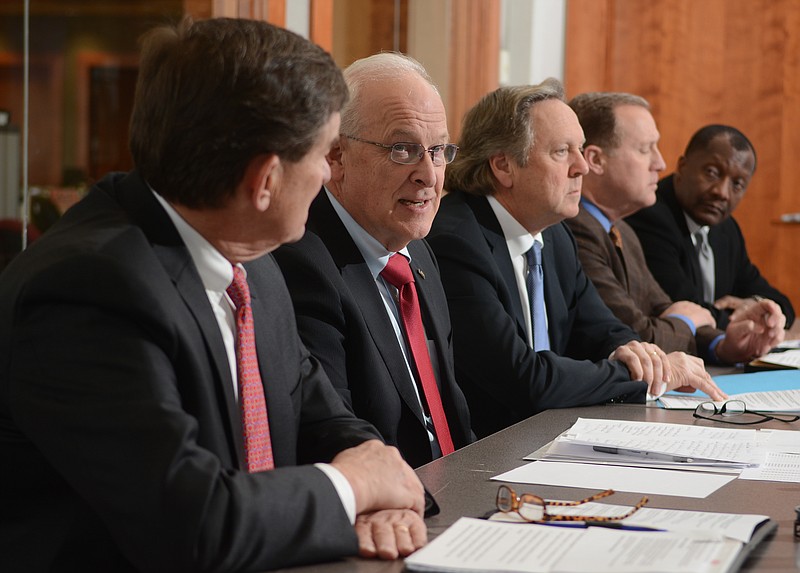Republican Gov. Bill Haslam said Wednesday that he expects to need the votes of all the Democrats in the GOP-led Legislature to pass his market-driven approach to Medicaid expansion under the federal Affordable Care Act.
"I think that's probably a fair observation that for this to pass, all the Democrats will have to be for it and, obviously, we'll have to have enough people to get to 50 [votes] in the House and 17 in the Senate," Haslam told reporters following a groundbreaking ceremony for Bridgestone Americas' new headquarters building in downtown Nashville.
The governor also said he anticipates releasing details on his Medicaid-funded Insure Tennessee program as early as today.
Lawmakers and some business groups have been clamoring for details since Haslam announced his two-pronged proposal to extend health insurance to an estimated 200,000 lower-income Tennesseans on Dec. 15.
His administration has been scurrying to commit to paper his oral agreement with the Obama administration. He plans to submit the agreement to the Legislature for approval and to the feds as a requested waiver of Medicaid rules for TennCare, the state's version of Medicaid.
"I think one of the grumblings has been we don't have anything to look at," Haslam said. "Obviously we're hurrying as much as we can to get the waiver finished. We want to make certain the waiver is right. If that's one of the concerns, then hopefully within 24 hours everybody will have a waiver and hopefully an executive summary on their desk."
Haslam has said his plan will need Democratic support. The 99-member House has 73 Republicans and 26 Democrats. The 33-member Senate has 28 Republicans and five Democrats.
It takes 50 votes to pass a House bill and 17 votes in the Senate.
During a meeting Tuesday with Times Free Press reporters and editors, several Republican lawmakers raised concerns about the lack of details three weeks after Haslam announced his Insure Tennessee proposal.
Rep. Mike Carter, R-Ooltewah, said that was one of the two "most frustrating" aspects of the proposal.
"We're paying for that care now," Carter said, citing the number of uninsured people showing up at emergency rooms, often for nonemergency care, at great expense. "So what I want to know, is this a better way of doing it?"
But, Carter said, "We absolutely have no idea how this is going to work." He said he doesn't know how he's going to vote but is "open-minded to the concept if it makes sense. The devil is always in the details."
Rep. JoAnne Favors, D-Chattanooga, said she's always supported expansion but is "anxious to see the specifics" and can't give it "100 percent support until I see that."
Haslam believes his proposed two-year waiver should prove an acceptable alternative to President Barack Obama's version of expanding the Medicaid program for the poor.
Expansion would cover adults earning up to 138 percent of the federal poverty level -- $16,100 for a single person and $32,913 for a family of four, just as the federal Affordable Care Act provides.
But Haslam's plan is a two-pronged initiative with free-market twists.
One, the Volunteer Plan, offers vouchers to working adults to help pay for their employers' private health coverage plans.
The other track is the Healthy Incentives Plan. It works more like a traditional Medicaid program, but has what Haslam considers important distinctions aimed at promoting health and responsibility. The list includes incentives for healthy behaviors, premiums and co-pays on services, all funded by an account that operates much like a Health Savings Account.
On Tuesday, House Minority Leader Craig Fitzhugh, D-Ripley, said in a letter to Haslam that while Democrats "are looking for every way possible to support your proposal ... we, too, have limitations."
Most of the concerns relate to the vouchers Haslam wants to give workers to help buy insurance from their employers.
For example, Fitzhugh said, can someone use a voucher to purchase plans on the federal marketplace exchange if the employer doesn't offer insurance? And what percentage of an individual's total medical costs will be covered by the vouchers?
But in a separate Times Free Press editorial board meeting on Wednesday, several supporters said the lack of specifics hasn't been an issue for them.
"We know the structure and it's just exactly what the doctor ordered," said Bill Gracey, CEO of BlueCross BlueShield of Tennessee.
"It's exactly what the system requires to do this cost-effectively and yet cover people who don't have coverage," Gracey said, later adding, "We know enough to be very comfortable with this plan."
Tennessee Hospital Association President Craig Becker agreed. THA members have volunteered to pay the state's share of the cost after federal funding drops from 100 percent now to 90 percent in 2016.
While the plan has support from an 80-member coalition of groups, including the Chattanooga Area Chamber of Commerce, THA and BlueCross BlueShield, some business groups have been keen to learn details of the voucher component.
"I don't know that we would [say] 'raise concerns,' but we would urge that we need to see some details on it," said Bradley Jackson, vice president of government relations for the Tennessee Chamber of Commerce and Industry.
"We're getting a lot of questions from our membership about how employers will be impacted. What's going to be the requirements on them? How exactly does the voucher work? Stuff like that."
Contact staff writer Andy Sher at asher@timesfreepress.com or 615-255-0550.
